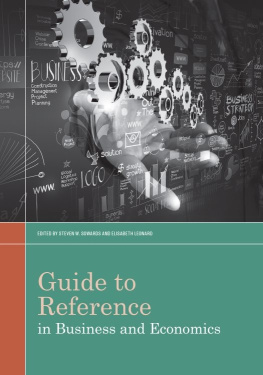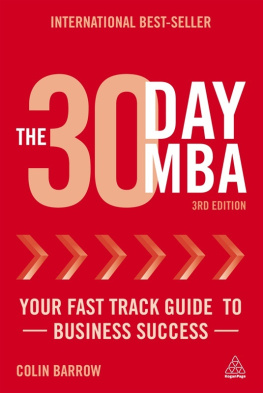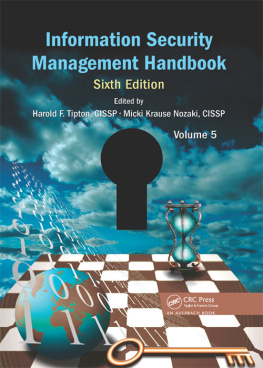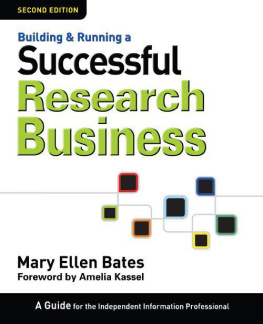Strausss Handbook of Business Information
A Guide for Librarians, Students, and Researchers
Fourth Edition
Hal P. Kirkwood

Copyright 2020 by Hal P. Kirkwood
All rights reserved. No part of this publication may be reproduced, stored in a retrieval system, or transmitted, in any form or by any means, electronic, mechanical, photocopying, recording, or otherwise, except for the inclusion of brief quotations in a review, without prior permission in writing from the publisher.
Library of Congress Cataloging-in-Publication Data
Names: Kirkwood, Hal, author. | Moss, Rita W. Strausss handbook of business information.
Title: Strausss handbook of business information : a guide for librarians, students, and researchers / Hal P. Kirkwood.
Description: Fourth edition. | Santa Barbara, California : Libraries Unlimited, [2020] | Earlier edition authored by Rita W. Moss. | Includes bibliographical references and index.
Identifiers: LCCN 2020007032 (print) | LCCN 2020007033 (ebook) | ISBN 9781440851308 (hardcover) | ISBN 9781440851315 (ebook)
Subjects: LCSH: BusinessReference booksBibliographyHandbooks, manuals, etc. | Business information servicesUnited StatesHandbooks, manuals, etc. | Government publicationsUnited StatesHandbooks, manuals, etc. | BusinessDatabasesHandbooks, manuals, etc. | BusinessElectronic information resourcesHandbooks, manuals, etc.
Classification: LCC Z7164.C81 S7796 2020 HF1010 (print) | LCC Z7164.C81 HF1010 (ebook) | DDC 016.33dc23
LC record available at https://lccn.loc.gov/2020007032
LC ebook record available at https://lccn.loc.gov/2020007033
ISBN:978-1-4408-5130-8 (hardcover)
978-1-4408-5131-5 (ebook)
242322212012345
This book is also available as an eBook.
Libraries Unlimited
An Imprint of ABC-CLIO, LLC
ABC-CLIO, LLC
147 Castilian Drive
Santa Barbara, California 93117
www.abc-clio.com
This book is printed on acid-free paper 
Manufactured in the United States of America
Contents
I
Basic Resources: Print and Internet
Basic Resources: Print and Internet
Accurate and timely business information is vital. Executives contemplating a plant relocation, for example, must consider such factors as corporate income tax rates, availability of workers and their average weekly wages, cost of living, climate, and community resources before making their decision. A marketing department will want to learn all it can about the economic and social characteristics of specific regions of the country so that it can decide how to target specific demographics or where best to launch a new product. Proprietors of new businesses may want to find out what kinds of financial assistance are available from government agencies and prospective investors, and to learn all they can about the recent successes (or failures) of related companies. Each of these situations illustrates the importance of information in business decision making, planning, and problem solving. Questions asked of researchers and librarians have become more complex, and users have become more demanding with the increasing availability of data and the continuously growing Internet. Users have become used to fast answers and also expect that everything they want to know is available somewhere. Librarians/researchers are also used to finding much of their information on the web, and this has affected the contents of collections housed within libraries.
Librarians and researchers seeking business information are confronted with an overwhelming number of books, periodicals, newspapers, government documents, databases, and web sources from which to choose. Examination of some of these sources will reveal that their quality varies considerably; some are superb but others are marginal at best. In an environment of fake news, conflicting opinions presented as fact, and the continuing growth in the available sources, librarians are challenged more than ever. To succeed, the librarian or researcher must decide not only where to go for the desired information but also how to select the best sources from the many available. This chapter lists and describes selected business guides and other fact-finding aids that identify some of the most widely used sources of business information. Also included in this chapter are major reference sourcesdictionaries, encyclopedias, and handbooks that may be available either in print or electronically.
Guides
Print bibliographic guides to business literature are no longer abundant. To find those that focus on specific business activities such as marketing and accounting, or management, it is often best to find a librarian or researcher who produces freely available guides. Examples are those created by the business librarians at Michigan State Universitys Gast Library, available at http://libguides.lib.msu.edu/busguides, and those compiled by the librarians at the Harvard Business Schools Baker Library, listed at https://www.library.hbs.edu/Find/Guides. An extensive collection of guides is available from the Business Reference and Services Section of the American Libraries Association at http://brass.libguides.com. There are many excellent guides globally, including the Singapore Management University at http://researchguides.smu.edu.sg, University of Oxfords Sainsbury Library at https://libguides.bodleian.ox.ac.uk/business, and IESE at https://iese.libguides.com. For people looking for guides that are less academically focused, those available at the New York Public Librarys Science, Industry and Business Library (https://www.nypl.org/collections/nypl-recommendations/guides) are valuable.
Most libraries produce guides, and these can be found through a simple web search. One of the advantages of using these resources is the constant updating so that new materials and links are included in a timely manner. They all tend to have something in common; they provide an overview of the area being covered; and they list, annotate, and sometimes evaluate relevant sources in a variety of formats. One caveat is that many of the listed resources may only be available to students attending that university. This section describes bibliographic guides that encompass the entire range of business activities.
Types of Business Guides
Business guides can be classified in several ways. They can, for example, be categorized by the breadth of coverage they provide. General guides cover many fields of business and may include handbooks and basic textbooks as well as reference sources. Selective guides, on the other hand, may include materials that point the user to only available commercial resources and another may include only free web sources. Dictionary guides are compilations of research materials in highly specialized areas such as robotics or corporate ethics. Although their level of subject specificity is valuable, dictionary guides lack the subject background provided by general and selective bibliographic guides. Finally, other guides are written with specific user populations in mind. They are written for managers and executives, researchers, women, business students, or novice library users. Each is written for a designated user group and describes the basic sources and research techniques most likely to be of interest to that group.
No single guide, no matter how thorough or well written, can possibly serve all needs. Therefore, representative examples of each type of guide may be essential sources in all but the smallest and most selective business reference collections. Some of the most important guides are described below.
Next page










